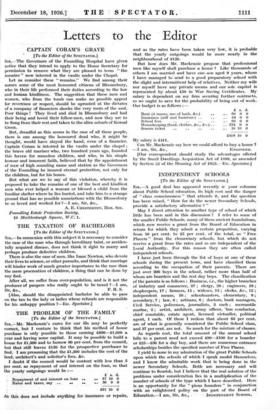THE PROBLEM OF THE FAMILY
[To the Editor of the SPECTATOR.] Sra,—Mr. Mackenzie's cures for 'our ills may be perfectly correct, but I venture to think that his method of house purchase is only possible 'to those earning £800--£1,000 a year and having some capital. It may be possible to build a house for £1,500 and to borrow 90 per cent. from the council, but that still leaves £150 for the prospective purchaser to find. I am presuming that the £1,500 includes the cost of the land, architect's and solicitor's fees, &c.
I doubt if the council would be content with less than 5 per cent. as repayment of and interest on the loan, so that the yearly outgoings would be :-
£ s. d.
Repayment of and interest on loan
67 10 0 Rates and taxes, say .. .. 30 0 0
£97
10 0
As this does not include anything for insurance or repairs, and as the rates have been taken very low, it is probable that the yearly outgoings would be more nearly in the neighbourhood of £120.
But how does Mr. Mackenzie propose that professional men like myself shall purchase a house ? Like thousands of . others I am married and have one .son aged 9 years, whom I have managed to send to a good preparatory school with the slight and intermittent help of relatives. Neither my wife nor myself have any private means and our sole capital is represented by about £50 in War Saving Certificates. My salary is dependent on my firm securing further contracts, so we ought to save for the probability of being out of work. Our budget is as follows :—
£ a. d.
Rent (4 rooms, use of bath, &c.)
• • .. 60 0 0 Insurance (self and furniture) ..
.. 44 0 0 School fees
.. 60 0 0 Housekeeping (food, clothes, &c., &c.)
.. 234 0 0 Season ticket ..
.. 10 10 0
£408 10 0 My salary is £411.
Can Mr. Mackenzie say how we could afford to buy a house ?
—I am, Sir, &c., ENGINEER. [Our correspondent should study the advantages offered by the Small Dwellings Acquisition Act of 1899, as amended by Section 22 of the Housing Act of 1928.—En. Spectator.]










































 Previous page
Previous page